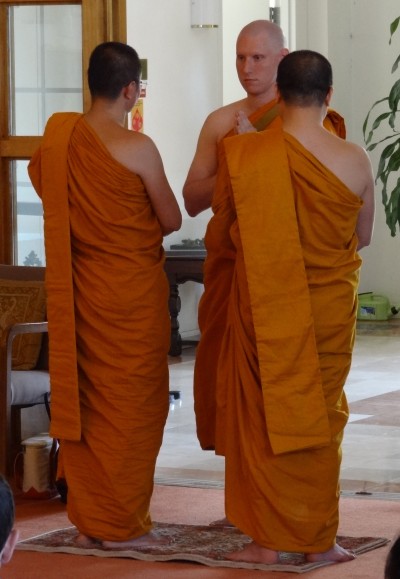How to Become a Thai Monk: Ordination Rules Posted by palmisano on Sep 24, 2013 in Culture
[This article is a continuation of a series of articles on becoming a Thai Buddhist monk.]
Before even becoming a monk there is a list of qualifications (อันตรายิกธรรม) you must first pass. You will be asked about each qualification along with additional questions about why you would like to be ordained. Below is the ordered list of 13 qualifications. During the monk ordination ceremony you will be publicly asked about each.

image: During ordination, two monks asked me a yes/no question about each of the 13 qualifications.
#1-5 – Can’t have any infectious diseases.
The rules actually list five specific diseases of which I won’t detail. The main intention of this rule is to not have any infectious disease that could infect the other monks.
#6 – Must be a human being (not a demon, animal, etc.).
There is a story of a creature who wanted to learn the teachings of Buddha and so became a monk. But he was discovered when he fell asleep and accidentally returned to demon form. They kicked him out the monkhood, not out of discrimination against non-humans, but because non-humans don’t have the mental capacity to learn Buddhism. Or so the story goes . . .
#7 – Must be male. (by birth, and without surgical alterations)
Actually, Buddha equally ordained both males and females as monks. But Thai culture does not. The culture that Buddha lived in was against it, too. In a later article I’ll explain how the rules often conflicts with the cultural norms in Buddhist monkhood.
#8 – Must not be a slave.
Otherwise, the investment of slave owners would be threatened.
#9 – Not have debt.
The point of this rule is to not become a monk to escape paying off a debt. Please don’t ask me about your mortgage.
#10 – Must be at least 20 years of age.
If you are under 20, you can only become a ‘naen’, or a novice monk.
#11 – Can’t work for the government.
While it is unclear to me if independent government contractors count, this rule I believe was written so politicians can’t use the monkhood to escape a political situation. Supposedly soldiers became ordained to avoid fighting in wars, too.
#12 – You must have permission from your parents.
Parents need you to tend to the farm, have children to continue the family name, take care of them in their old age, etc. It is part of the Asian ‘respect and listen to your elders’ tradition. In Buddha’s time, newly ordained monks rarely saw their family again – so parental permission wasn’t to be taken lightly!
#13 – Already own your monk robes.
Buddhist supply stores sell them. Sometimes the temple will give you some at no cost.
Beyond these rules there is also one unwritten rule:
#14 – If you come from another religion you must first follow a monk for four months.
This rule exists to ensure people make an informed decision before converting. Not all Thai temples will require this, however.
After becoming a monk there are many other rules to follow. I’ll go over those in the next few posts.

Build vocabulary, practice pronunciation, and more with Transparent Language Online. Available anytime, anywhere, on any device.



